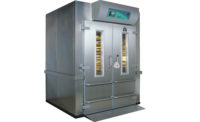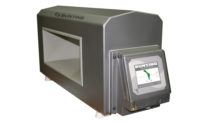Bakers and snack manufacturers want hygienically designed scales that feature enhanced connectivity, data integration and wireless options among their top choices.
When it comes to scales, bakery and snack food producers are demanding hygienically designed weighing equipment that features data integration and convenient wireless options. They’re also looking for weighing equipment that is versatile enough to handle multiple products with minimal downtime. To a great extent, manufacturers of weighing equipment have answered the call.
With product mixes and ready-to-eat meal trends impacting how food companies weigh and package their products, scale manufacturers have developed solutions for blending products that improve weight accuracy and reduce waste, while maintaining traceability with advanced hardware and software.
Eric J. Schmitt, industrial food segment manager of Mettler Toledo Industrial Marketing, Columbus, Ohio, says he sees certain trends impacting the bakery and snack food market:
• Formulation and batch control solutions that provide full documentation of the process to be followed are critical today, as is full traceability of all raw materials and ingredients used.
• Data integration—weighing equipment that can easily integrate with overall plant systems.
• Hygienically designed equipment that provides easy and thorough cleaning and reduces risk of contamination and cross-contamination, including potential high-risk allergen ingredients.
Bakery and snack food producers today want (and receive) greater connectivity options in actual food production areas than they did five years ago. These options include Ethernet, universal serial bus (USB), wireless local area network (WLAN) and Bluetooth, say experts. Producers are seeking easy ways to connect scales as a data-gathering point to internal information systems.
Significant developments in scale manufacturing are happening in software design, according to Christie Taraborelli, marketing manager at WeighPack Systems, Montreal. “Our 360 operating software is built on a Windows 8 platform and is pre-stored with software such as Skype and LogMeIn for remote support, and production reporting with Crystal Reports. This offers unlimited recipe storage, free online support and multilingual operation.”
Control and display
Ease-of use, improved sanitation and wireless access are major components of the latest scales, agrees Brian Barr, sales manager for packaging systems, Heat and Control Inc., Hayward, Calif. “Ishida RV weighers allow users to control operation and view statistics via an Android-based tablet and smartphone,” he notes. “Diagnostics can be performed from remote locations, often eliminating the need for an onsite service visit.”
Scales manufactured by Doran Scales Inc., Batavia, Ill., feature weighing systems with integrated wired and wireless Ethernet options, even in washdown environments, according to CEO Mark Podl. Adding further value to this option, the company has introduced several software programs, including QC Weigh and Waste Traxx.
“QC Weigh replaces handwritten quality control (QC) records with digital QC data, providing management with more reliable quality control data,” Podl says. “Paired with our Model 2200CW checkweigher, equipped with a light tower, the system prompts employees to take sample weights at intervals that management configures. It provides quality control data that plant management can trust and keeps employees accountable.”
Waste Traxx was developed by Doran in response to the need for bakery and snack food plants to monitor and track down the source of their production waste, he adds. Many plants have placed greater emphasis on sustainability, and the subject of food waste has gained a lot of public attention recently. This product addresses both concerns, he notes.
Hi-Speed Checkweighers from Mettler Toledo HI-Speed, Ithaca, N.Y., provide PackML v3.0 machine state information through common field bus interfaces, says Mark Feher, business development manager. “Producers send this information to their OEE (overall equipment effectiveness) software applications, which then determines how efficient their production line is operating,” he explains. “This data helps producers continuously work at optimizing their efficiency, so they can continue to meet customer demand.”
WeighPac Systems has developed a PC tablet for remote operation of its multihead weigher. “This tablet addresses several operational nuances to improve efficiency in our customer’s packaging processes,” Taraborelli explains. “Users can operate their scales remotely. They no longer need to go between weigher and controls to troubleshoot or calibrate. Managers can view production in real time, and watch actual product flow via a live camera feed.”
AP Dataweigh Inc., Cumming, Ga., recently launched a Rockwell/Allen Bradley-based checkweigher platform and control system. The addition of the Rockwell systems across its entire line of checkweighers benefits bakeries and snack producers in many ways, according to Steve Van Duzen, senior vice president of sales. The reason: Plants that use Rockwell Automation solutions can now take advantage of full RSLogix 5000-based solutions.
“As a result, checkweighers can communicate natively across the entire production line,” Van Duzen explains. “Through the use of real-time data and communications, these systems can detect and help troubleshoot other equipment and processes up-line from the checkweighers. This increases production line uptime, alerts maintenance to potential issues before they become major problems and produces real-time statistical data.”
New weighing equipment is being designed to accommodate new food-safety regulations and sustainability initiatives, as recent Food Safety Modernization Act (FSMA) regulations are placing increased demands on compliance. Bakery and snack food producers also are demanding durability to withstand today’s sanitation regimen, which includes cleaning agents and chemicals, high temperatures, high water pressure and condensation.
Ishida RV-Series weighers available from Heat and Control are designed for sanitary operation in food plants. “Even for non-washdown operations, the RV’s IP69K rating ensures easy cleaning and trouble-free weighing,” says Barr. “Sloped self-draining surfaces reduce areas where product particles and bacteria can accumulate,” he notes. “Improved product feeders and electronics make the RV-Series 15% faster than Ishida’s previous R model. In addition, automatic setup provides fast, error-free changeovers.”
RV-Series weighers also are built to RoHS (Restriction of Hazardous Substances) standards. Circuit boards have a lead-free finish and the weigher contains no mercury, cadmium or hexavalent chromium components. In addition, gaskets and seals are made from Food and Drug Administration (FDA)-approved materials, Barr notes.
With an eye on cleanliness, Mettler Toledo Industrial Marketing recently launched the ICS line of stainless steel bench scales for both heavy washdown and light washdown applications. The company also introduced the PUA669 Sanitary Lift Floor Scale.
Doran Scales offers a FC6300 Formula Control Scale that provides ingredient savings as well as a lot-tracking feature for traceability. “Mock recalls can be done in minutes, which helps meet requirements mandated by the FSMA,” says Podl. “As far as sustainability goes, the FC6300 facilitates accurate minor ingredient usage and the elimination of bad batches. In addition, Waste Traxx software helps bakery and snack food producers track down the source of wasted product.”
Down the road, bakery and snack food plants will continue to pose challenges to manufacturers of scales and related measuring equipment. Raw dough is just one variable that presents a challenge, concludes Feher. “Product handling is critical in checkweighing and raw dough is very inconsistent in how it transfers across the belts,” he explains. “Dough can stick to conveyor belts or it can relax (expand), creating an inconsistent product length that is more difficult to weigh accurately. What’s more, there are always challenges regarding cleanability and sanitary design in any food-processing and packaging environment.”













